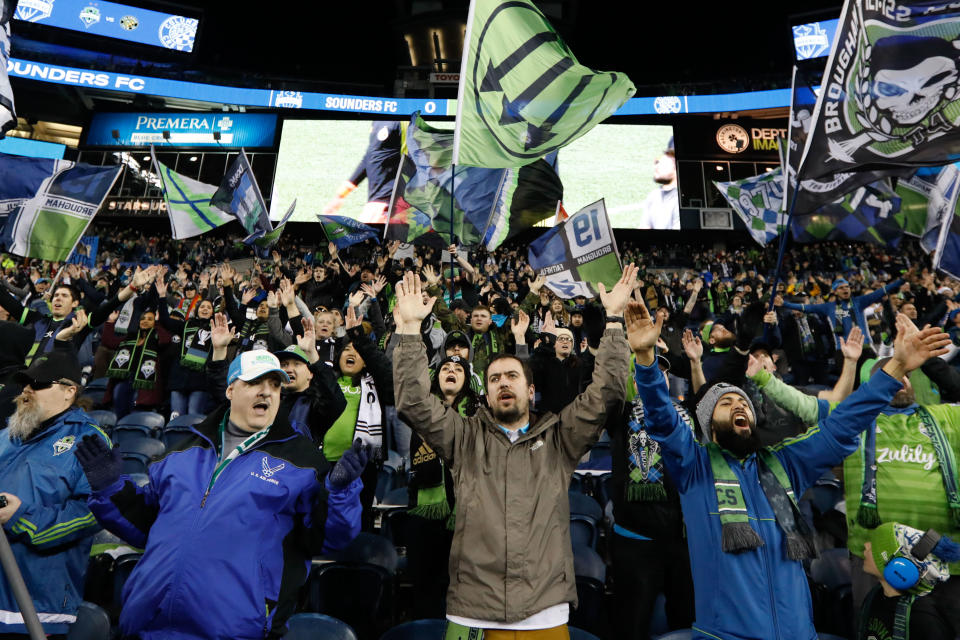MLS Commissioner: Playing in empty stadiums would be particularly bad for us
Major League Soccer was among the many sports leagues that paused their seasons on March 12 due to coronavirus, following the NBA’s lead. At first, MLS announced it would only suspend its season for 30 days. Just one week later, it extended the suspension, with a target date of May 10. On April 17, MLS agin extended its suspension until “at least June 8.”
As of now, all U.S. sports remain shutdown, though each league is examining its own potential return plan. MLS had only gotten through 26 matches of its 2020 season.
MLS Commissioner Don Garber says he is optimistic the league will be able to resume its season. “We’re working on all sorts of contingency plans” to reopen, Garber told Yahoo Finance last week. He also said on Nashville SC’s YouTube channel that one month ago, “we were very pessimistic,” but now he’s “more optimistic about what a return to play plan could look like.”
There’s just one hurdle that’s a bigger problem for MLS than any of the other leagues: dependence on game day revenue.
‘The vast vast vast majority of our incomes does come from game day revenues’
All of the leagues that had to pause their seasons are expecting to play games in empty arenas once they return (if they can return), at least at first. That’s what the Chinese Professional Baseball League (CPBL) in Taiwan, which returned on April 11, and the Korean Baseball Organization (KBO) in South Korea, which returned on May 5, have done to start.
No fans in the arenas means no ticket sales, no suites, no concessions, no parking fees, no in-stadium merchandise. And MLS is particularly reliant on game day revenue.
“It’s not ideal for any sport whatsoever to [play in front of] no fans, I don’t care whether it’s college sports, Olympic sports, or the major league sports,” Garber told Yahoo Finance. “Unfortunately for our league, the vast vast vast majority of our income does come from game day revenues, so it has a different economic impact on us.”

In 2013, the portion of MLS revenue that came from game day sales was as high as 90%, though that has likely come down a little, thanks to a TV deal with Fox and ESPN and an apparel deal with Adidas, each worth $90 million per year to the league. For comparison, MLB gets 40% of its league revenue from game day revenue, and that’s still much higher than the NFL, which gets less than 15% of its revenue from gate receipts. (For the NFL, it’s all about television; broadcast deals make up more than half of that league’s revenue.)
‘A hole in the heart of every fan and every club’
Garber did say that if MLS must return with no fans at games, it will do so: “Our players want to play, our coaches want to coach, our fans want to see some kind of competition. If that requires us to do that without fans, and we’re able to do that safely, then we’ll do that.” But it would mean a major loss of revenue. (MLB is currently dealing with the same hurdle: The club owners are pitching to the Players Association a plan to start up in July and play half the usual number of games, but with a 50/50 revenue split to offset the lost game day revenues; that would bring players less money than they’d normally get, and the players are reportedly wary of setting a precedent for the next collective bargaining agreement negotiations next year.)
This was Major League Soccer’s 25th season, originally planned to be a special year. Two new expansion teams had just launched, and four more are set to launch in the next two years. If worrying about when and how to restart its season isn’t enough of a headache, MLS will also have to reexamine those expansion plans.
“It’s a hole in the heart of every fan and every club when you’re not able to play games, in particular in Miami and Nashville, where we had two new teams coming in,” Garber says. “When we get back, those teams will pick up where they left off. And now we need to think about what is the future rollout of our teams in Austin, and Charlotte, and St. Louis, and Sacramento. That’s something we’re working on now. There’s no doubt that we’re contemplating: Will there be any effect of the Covid crisis on expansion? Right now it’s not really affecting that, but it’s something that we’re going to have to think about.”
—
Daniel Roberts is an editor-at-large at Yahoo Finance. Follow him on Twitter at @readDanwrite.
Read more on how coronavirus is hitting the sports world:
Korean baseball's return is a bitter pill for American sports, but a win for ESPN
DraftKings completes merger that brings it public, with no sports going on
Nike is poised to weather coronavirus far better than Adidas and Under Armour
Fanatics sees core parts of its business fall 100% with sports on hold due to coronavirus
Nike, Lululemon say they learned lessons from coronavirus closures in China they can apply to U.S.
Coronavirus hits sports leagues: March Madness canceled; NBA, NHL, MLS seasons on hold
